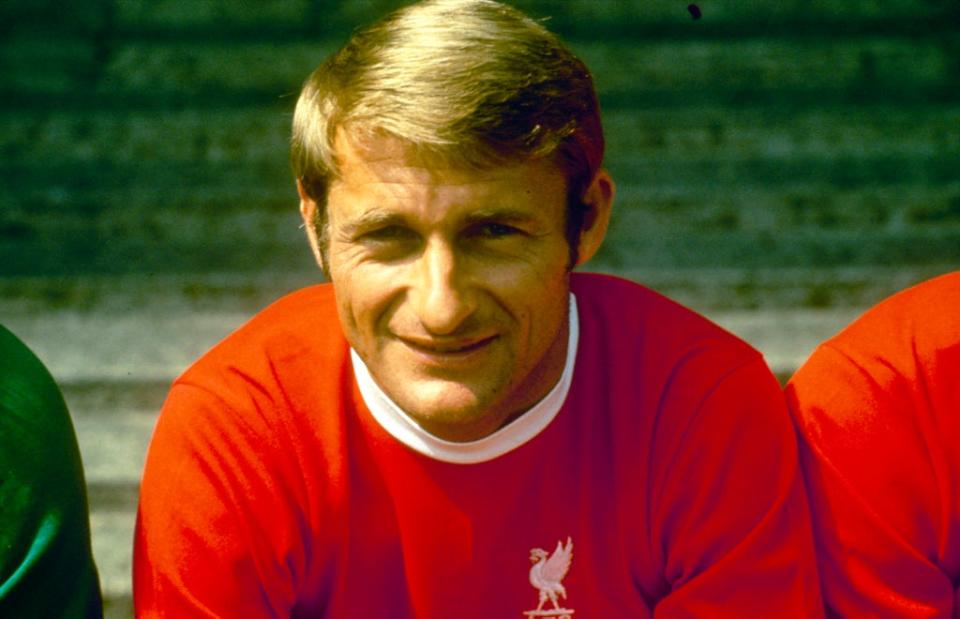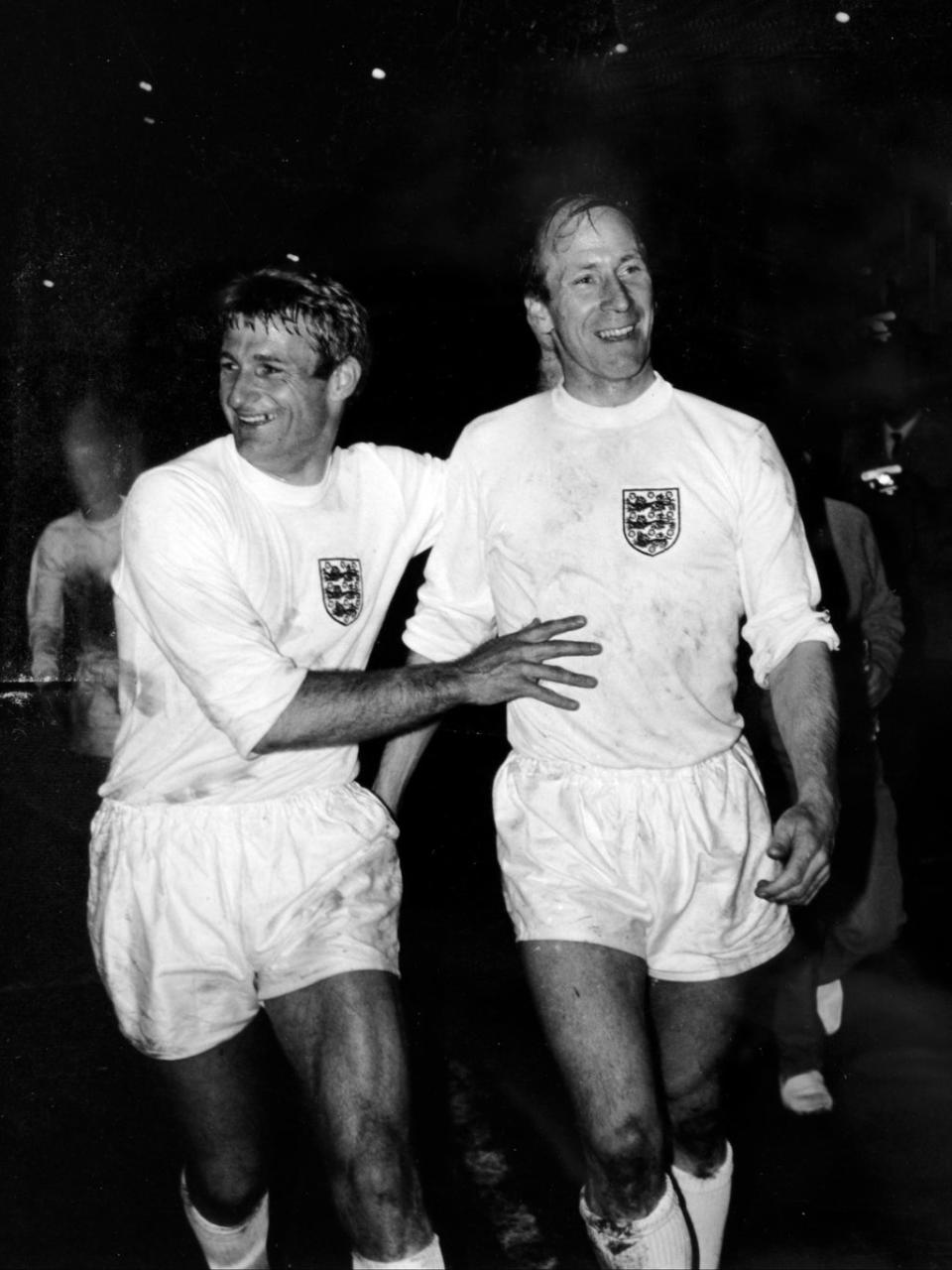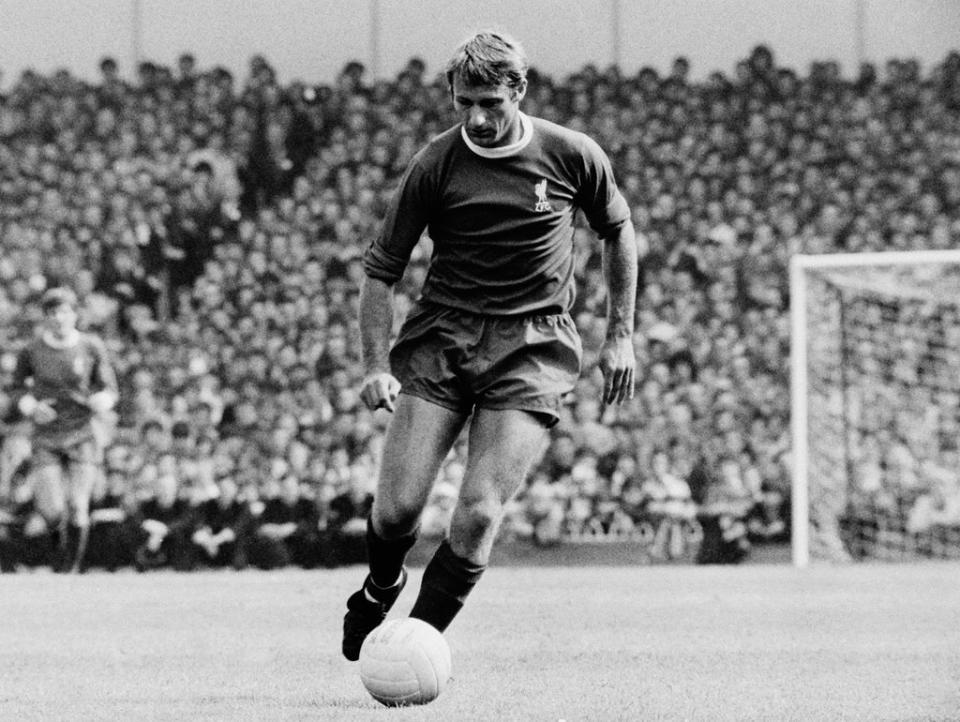Roger Hunt: Uplifting footballer and part of England’s 1966 World Cup winning team

Officially he was never knighted, but to the wildly partisan, razor-witted denizens of the Anfield Kop, not noted for their tendency to stand on ceremony, he was Sir Roger.
Hunt, who has died aged 83, with the exception of the Merseysiders’ revered manager Bill Shankly himself, was the most potent and enduring symbol of the great Liverpool football side of the 1960s.
Unlike his gleefully mischievous boss, there wasn’t the merest hint of flamboyance about Hunt. Indeed, there was no more engagingly down-to-earth character among the game’s elite, but the unassuming, flaxen-haired Lancastrian was a lovely, uplifting footballer who scored goals by the bucketful.
However, despite his noble contribution to England’s victory in the 1966 World Cup, he remained one of the most underrated players of his generation.
No man symbolised Shankly’s wonderful team, and his deceptively simple footballing philosophy, based on hard graft and the pass-and-move mantra, more completely than Hunt.
He wasn’t endowed with extravagant natural ability, but he was a prodigiously powerful athlete who played as if he would have laid down his life for his side, running miles off the ball to make space for teammates, and although he was aggressive within the rules of engagement, he took fearsome physical punishment without retaliation.
Hunt’s wholesome aura was captured aptly by a former Kopite, Stan Green, in a 1995 description of the prolific marksman whose 244 league strikes for Liverpool remains a club record.
“All the players were idols, but Roger was also the guy next door, an everyday sort of chap. Watching him, you felt he was a mate. Somehow he was not only playing for Liverpool, but also for the folks in the ground who were kicking every ball with him. He had the common touch and he fed people’s dreams. They liked to think if Roger could do it, then so could they. It was almost as if the Reds had been a man short so Shanks had pulled Roger out of the Kop and he’d started playing. To me, he was the heart of Liverpool FC ... people didn’t just marvel at what he could do, they loved him.”

Growing up in the village of Culcheth as a fan of Bolton Wanderers and excelling at school, Hunt contemplated a career in football, but when a trial at Bury failed to earn a contract, he decided to enter the family haulage business.
Then, with a working life in the cab of a lorry beckoning, he was spotted by Liverpool while playing for the Cheshire amateurs, Stockton Heath, and in May 1959 he turned professional.
Almost immediately he was elevated to first-team status, scoring on his debut in the Second Division clash with Scunthorpe United that September, and three months later he was in at the beginning of the Shankly revolution, when the passionately committed Scot arrived to begin the Anfielders transformation from perennial under-achievers into the English game’s dominant force for a quarter of a century.
Hunt finished that term as Liverpool’s joint top-scorer with Dave Hickson on 21 league goals, but it was in 1961-62 that he sprang to national prominence. Forming a bountiful partnership with newcomer Ian St John, he struck 41 times in as many games, including five hat-tricks as the Reds romped away with the Second Division title.

Now the pundits began to marvel at Hunt’s savage shot, his sudden and destructive acceleration, the bull-like strength that made him almost impossible to shrug off the ball and that seemingly endless capacity for work. Also, less obvious to laymen but deeply appreciated by his professional peers, there was his sensible distribution, refusal to hide when times were tough, and a native soccer intelligence that enabled him to capitalise on those myriad assets.
Accordingly, in April 1962, he was called up for his first England cap and, predictably to all who had monitored his meteoric rise, he marked the occasion by scoring at Wembley in a 3-1 victory over Austria.
Next came the challenge of prospering in the First Division, which the rampaging front-runner did to devastating effect, meshing ever more fluently with the formidably combative but deliciously subtle St John as Liverpool began accumulating silverware in earnest.
First came the Championship in 1963-64, towards which Hunt contributed 31 strikes, and the image of him crashing home the final goal in the 5-0 demolition of Arsenal on a sublimely sunny Anfield afternoon, thus clinching the title with three matches to spare, has remained one of the most vivid of the Shankly era.
The next milestone was nodding the opening goal in the FA Cup Final triumph over Leeds United a year later, at the end of a campaign in which he also earned handsome plaudits for his part in Liverpool’s enthralling progress to the last four of the European Cup. In particular, a spectacular volley in the Reds’ fabulous 3-1 victory over Inter Milan in the first leg of the semi-final captured the imagination of the continental footballing community, and no less a soccer sage than Helenio Herrera, famous coach of the Italian giants, went into raptures over Hunt’s work.
Yet in terms of sheer achievement, the best was still to come. In 1965-66 he hit the target 30 times in 37 outings as the Reds claimed another First Division crown, and the following summer came the little matter of the World Cup.

Doing his best to ignore the ongoing national debate about which two out of Jimmy Greaves, Geoff Hurst and himself should form England’s dual spearhead, Hunt just got on with his job, netting twice in the defeat of France which ensured that Alf Ramsey’s team reached the quarter-finals.
Then, after striving unselfishly and productively as Argentina and Portugal were overcome, he shivered in his boots as the manager pondered his selection for the final. In the event, Greaves was the odd man out and Hunt sampled ultimate soccer glory.
Not only that, but he was the nearest witness to the most controversial incident international sport has known when, with the score at 2-2, Hurst’s drive rebounded from the crossbar. Did it cross the line? The Germans maintained that it didn’t; TV and photographic evidence were inconclusive, but Hunt, who had followed in Hurst’s shot in the hope of converting any stray rebound, was in no doubt. It was a goal, he declared, and the record books bear him out and the World Cup was won.
The bulk of the plaudits went to other men, the likes of Bobby Moore, Bobby Charlton, Geoff Hurst, even the abrasive little midfield enforcer Nobby Stiles, but Hunt’s colleagues were in no doubt about his colossal value to their cause. As Charlton put it: “Roger was hugely missed if he wasn’t there. He took the load for lots of people; I know he did an awful lot for me. At club level, if you wanted to beat Liverpool you knew you’d have to work as hard as them. That meant working as hard as Roger Hunt, and that wasn’t easy.”
Thereafter his England career continued until 1969 when, aged 31 and having netted 18 times in 34 games, he withdrew gracefully from the international scene. Later that year, having slipped to the fringe of the Liverpool side as Shankly began to rebuild, Hunt joined Bolton, his boyhood favourites.
He remained at Burnden Park for two and a half seasons, but was unable to prevent the toiling Trotters from dropping into the Third Division, and in April 1972 he retired from football to concentrate on the haulage company that had so nearly claimed him some 13 years before.
However, he remained in close touch with the game by joining the Football Pools Panel in 1974, becoming chair in 1995.
In 2000 he was awarded an OBE for his World Cup role and was inducted into the English Football Hall of Fame in 2006.
Roger Hunt, footballer, born 20 July 1938, died 27 September 2021
Read More
Jimmy Greaves: Legendary England, Spurs and Chelsea goalscoring genius and broadcaster
Ian St John: Footballer who gave a new dimension to Shankly’s Liverpool
Jimmy Greaves: Legendary England, Spurs and Chelsea goalscoring genius and broadcaster

 Yahoo News
Yahoo News 